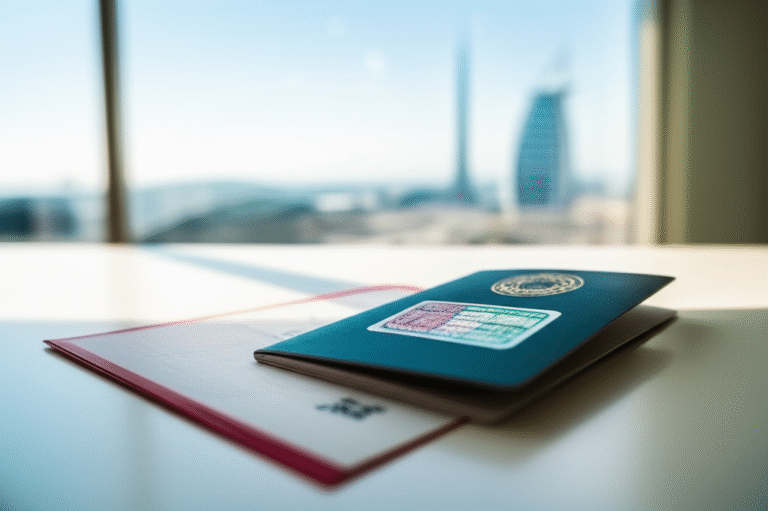How to Remove 1 Year Labour Ban in UAE

Removing a 1-year labour ban in the UAE is achievable with the correct understanding of the process and potential exceptions. Most bans can be lifted by obtaining a No Objection Certificate (NOC) from your previous employer or by meeting specific eligibility criteria for a new work permit.
Key Takeaways
- Understand ban triggers and types specific to UAE labour law.
- Explore options like No Objection Certificates (NOC) for ban removal.
- Learn about exemptions for specific professions and situations.
- Discover the role of the Ministry of Human Resources and Emiratisation (MOHRE).
- Gather necessary documents for ban lifting applications.
- Seek professional advice for complex cases.
Landing a job in the UAE is a dream for many. However, sometimes circumstances lead to a labour ban, which can feel like a significant road bump. If you’re facing a 1-year labour ban in the UAE, you might feel stuck. But don’t worry; understanding the process is the first step to getting back on track. This guide, presented with the clarity and insight you expect from UAE Stayinn, breaks down exactly how to navigate this situation. We’ll cover what a labour ban is, why it happens, and the practical steps you can take to lift it. Let’s explore the path to resuming your career journey in the Emirates.
Understanding the 1-Year Labour Ban in the UAE

A labour ban in the UAE is a restriction placed on an individual preventing them from obtaining a new work permit and residence visa with a different employer for a specific period, typically one year. This ban is usually issued by the Ministry of Human Resources and Emiratisation (MOHRE), formerly known as the Ministry of Labour. It’s an essential part of maintaining order in the labour market, ensuring fair practices for both employers and employees. For expats, understanding the nuances of these regulations is crucial for long-term career planning and staying compliant with UAE immigration laws.
Common Reasons for a 1-Year Labour Ban
Several situations can lead to a 1-year labour ban. The UAE’s labour laws are designed to protect all parties involved in an employment contract, and a ban is often a consequence of contract termination or certain breaches. Understanding these reasons can help you avoid inadvertently triggering a ban in the future.
- Resignation without Notice: If an employee resigns before the end of their fixed-term contract without a valid reason, or fails to serve the required notice period as per their contract and UAE Labour Law, a ban may be imposed. This is to compensate the employer for losses incurred due to the abrupt departure.
- Termination for Cause: In cases where an employee is terminated for gross misconduct as defined by Article 44 of the UAE Labour Law, a ban can be applied. Examples include forging documents, revealing company secrets, or continuous absence without a valid reason.
- Absconding from Duty: If an employee leaves their job without informing their employer and stops coming to work, they are considered to have absconded. This often results in an automatic ban.
- Breach of Contractual Obligations: Failing to fulfill the terms of the employment contract, especially if it causes significant harm to the employer, can lead to a ban.
- Illegal Employment: Working for a company without a valid work permit or visa, or working for an unauthorized sponsor, can result in fines and a labour ban.
Distinguishing Between Types of Bans
It’s important to know that not all bans carry the same restrictions. While a 1-year ban is common, there are other types:
- 6-Month Ban: Often issued for standard resignation cases at the end of a fixed-term contract or after completing the contract, without specific employer complaints.
- Permanent Ban: This is the most severe and is typically reserved for very serious offenses, such as fraud, security-related issues, or involvement in criminal activities.
As UAE Stayinn, we emphasize that for most standard employment-related issues, the 1-year ban is the most frequently encountered scenario. Understanding this allows for targeted solutions.
How to Remove a 1 Year Labour Ban in UAE: Step-by-Step
Lifting a 1-year labour ban in the UAE is a structured process. The key is to determine which path is applicable to your specific situation. The Ministry of Human Resources and Emiratisation (MOHRE) oversees these procedures, ensuring fairness and order in the job market. Here’s a breakdown of the common ways to get your ban removed.
Option 1: Obtaining a No Objection Certificate (NOC)
The most straightforward way to remove a ban is by obtaining a No Objection Certificate (NOC) from your previous employer. An NOC is a formal document stating that your former employer has no objection to you working for another company in the UAE. This is particularly relevant if you left your previous job without completing the contract or serving your notice period. The employer can choose to issue an NOC, effectively waiving their right to enforce the ban.
Process for Obtaining an NOC:
- Communicate with Your Previous Employer: Approach your former employer and discuss your situation. Explain your desire to work elsewhere and request an NOC. Be prepared to negotiate or offer compensation for any losses they might have incurred due to your departure, especially if you resigned early.
- Formal Request: Submit a formal written request for the NOC. This could be an email or a formal letter.
- Employer’s Issuance: If the employer agrees, they will issue the NOC on their company letterhead, signed and stamped by an authorized signatory. The NOC should clearly state that there is no objection to you obtaining new employment in the UAE.
- Submission to MOHRE: With the NOC in hand, you can then apply for a new work permit with a new employer. Your prospective employer will typically handle the submission of the NOC and other required documents to MOHRE.
Note: While an NOC is the most direct route, not all employers are willing to provide one. In such cases, you’ll need to explore other options.
Option 2: Work Permit Without Sponsor’s NOC (Exemptions)
The UAE government recognizes that not all situations allow for an NOC. Therefore, there are specific circumstances and professional categories that permit individuals to obtain a new work permit without their previous employer’s NOC. These exemptions are designed to facilitate the movement of skilled talent within the UAE economy and to address specific labour market needs.
Common Exemptions to the Labour Ban:
Under current UAE labour laws, a ban can be lifted without an NOC in the following scenarios:
- Skilled Workers: Individuals holding a Level 1, 2, or 3 skill level classification as per MOHRE’s criteria can often obtain a new work permit without an NOC if they have completed their contract. If they resigned before the contract end date, they might still be eligible for a new permit under certain conditions, especially if they have specialized skills.
- Expired Contracts: If you have completed your fixed-term employment contract with your previous employer, you are generally eligible to transfer to a new employer without needing an NOC. The ban is non-applicable in this scenario.
- Non-Fixed Term Contracts (Old Law): For indefinite contracts signed before the current labour law (Federal Decree-Law No. 8 of 2017) came into effect, specific provisions apply for transfers without NOC.
- Specific Professions: Certain professions, particularly those in demand or those deemed essential, might have more lenient rules regarding NOC requirements.
- Company Liquidation/Closure: If your former employer’s company has been liquidated or has ceased operations, you may be able to get a ban lifted without their NOC.
- Employer’s Default: If your previous employer failed to meet their contractual obligations (e.g., delayed salary payments for extended periods), you might be able to apply to MOHRE to have the ban waived based on their default.
- Following a Court Order: In some legal disputes, a court might order the removal of a ban.
Important Note: The eligibility criteria for these exemptions can be complex and are subject to changes in UAE labour law. It is always advisable to check the latest regulations or consult with a legal professional.
Option 3: The New Work Permit Application Process (Without NOC)
If you qualify for an exemption and do not have an NOC, your new prospective employer will initiate the process of applying for a new work permit. They will need to demonstrate to MOHRE why you should be granted permission to work for them despite the existing ban.
Steps Involved:
- New Offer of Employment: Secure a new job offer from a UAE-based company.
- Employer’s Application: Your new employer submits a work permit application to MOHRE. This application will include details about your qualifications, the job role, and the reasons for requesting a waiver of the labour ban.
- MOHRE Review: MOHRE reviews the application, considering your skill level, the reason for the ban, and the justification provided by the new employer. They will assess if your case falls under one of the eligible exemption categories.
- Approval or Rejection: If approved, a new work permit will be issued, allowing you to proceed with your new residency visa application. If rejected, you may need to reconsider your options or seek further clarification.
Navigating the Ministry of Human Resources and Emiratisation (MOHRE)

The Ministry of Human Resources and Emiratisation (MOHRE) is the primary government body responsible for labour relations in the UAE. Understanding its role and how to interact with it is fundamental when dealing with labour bans. MOHRE’s online services and customer service centers are key resources.
MOHRE Online Services and Portals
MOHRE has significantly digitized its services. Many processes, including checking for bans and applying for work permits, can be initiated online through their official website or the UAE Pass mobile application:
- Bayan System: MOHRE’s systems allow for the tracking of labour contracts and the status of bans.
- Official Website: The MOHRE website (mohre.gov.ae) provides comprehensive information on labour laws, regulations, and services. You can find details about ban exemptions and application procedures.
- Smart Services: Employers can use the MOHRE portal to apply for work permits, manage employee contracts, and settle labour disputes. Employees can check their contract status and ban information.
External Link: For the most current information directly from the source, visit the official Ministry of Human Resources and Emiratisation website.
Customer Service Centers
For those who prefer face-to-face assistance or have complex queries, MOHRE operates customer service centers across the UAE. These centers are staffed by officials who can provide guidance, help with applications, and resolve issues related to labour contracts and bans.
Required Documents for Ban Removal
The specific documents required can vary depending on your situation and the method you use to lift the ban. However, some core documents are almost always necessary. Having these prepared beforehand will expedite the process considerably.
Essential Documents Checklist
- Passport Copy: A clear copy of your valid passport.
- Visa Copy: If you currently hold a UAE residence visa, a copy of it.
- Emirates ID Copy: A copy of your Emirates ID card.
- Labour Contract: Copies of your previous and, if available, your new employment contract.
- No Objection Certificate (NOC): If you are using this route, the original or a stamped copy.
- Educational Certificates: Attested copies of your educational qualifications, especially if applying under skilled worker categories.
- Passport-Sized Photographs: Recent photographs meeting UAE visa specifications.
- Resignation Letter/Termination Letter: Copies of any formal communication regarding your departure from your previous employer.
- Proof of Company Closure/Liquidation: If applicable.
- Court Orders: If the ban removal is based on a court ruling.
Pro Tip: Always keep digital copies of your important documents (passport, visa, Emirates ID, previous contracts) readily accessible on a cloud storage service or a secure personal drive. This makes it easier to share them quickly with potential employers or authorities when needed.
Ban Lifting Fees and Costs
Removing a labour ban involves certain government fees. These fees are generally paid by the new employer when applying for the work permit, but it’s good to be aware of them. The costs can vary based on skill level, nationality, and the specific service required.
Estimated Fee Structure
While exact figures can fluctuate, here’s a general idea of what to expect. The fees are typically divided into:
- Work Permit Application Fee: This is charged by MOHRE for processing the new work permit.
- Establishment Card Fee: Paid by the employer.
- Other Administrative Fees: Related to visa processing and Emirates ID changes.
It’s best to confirm the current fees with your prospective employer or directly with MOHRE.
What Happens After the Ban is Lifted?
Once the ban is officially lifted and your new work permit is approved, the next steps involve completing your new residency visa application. This typically includes undergoing a medical fitness test and obtaining a new Emirates ID.
New Visa and Emirates ID Process
- Medical Fitness Test: You will need to undergo a medical examination at an authorized government health center.
- Emirates ID Application: Submit your application for a new Emirates ID card.
- Visa Stamping: Once the above steps are cleared, your new employer will arrange for your new residence visa to be stamped in your passport.
Can a 1-Year Labour Ban Be Waived by Paying a Fine?
In the past, it was sometimes possible to pay a government fine to lift a ban immediately. However, under the current UAE Labour Law (Federal Decree-Law No. 8 of 2017 and its amendments), the focus has shifted from direct financial penalties for ban waivers to eligibility based on skill level, contract completion, and specific exemptions. While fines can be imposed for labour law violations, directly “buying” your way out of a 1-year ban without meeting exemption criteria is generally no longer the standard procedure for most individuals. The emphasis is on fair labour practices and ensuring that bans are lifted based on merit and adherence to legal frameworks.
Table: When a 1-Year Labour Ban Applies vs. When it Might Be Waived
| Scenario | Likelihood of 1-Year Labour Ban | Possibility of Waiver/Removal |
|---|---|---|
| Resignation before fixed-term contract end without valid reason or notice. | High | Requires NOC from employer, or may be waived for skilled workers (Level 1-3) or specific professions. |
| Termination by employer for gross misconduct (Article 44). | High | Generally difficult to waive. Depends on investigation findings by MOHRE. |
| Absconding from duty. | High | Difficult to waive. May require settlement with employer or specific MOHRE approval. |
| Completion of a fixed-term contract. | No Ban (Generally) | N/A – No ban imposed. Easy to transfer. |
| Termination by employer without valid cause (after probation). | Possible (but ban may be shorter, e.g., 6 months or waived) | Often waived or shorter ban applies, especially if employee claims unfair dismissal. |
| Employee is a skilled worker (Level 1-3) who completed their contract. | No Ban | N/A – Easy transfer. |
| Employee is a skilled worker (Level 1-3) resigning early. | Possible, but often waived. | MOHRE may waive ban for skilled workers regardless of resignation reason, to retain talent. |
| Employer’s company is liquidated. | Possible, depending on circumstances. | Often waived by MOHRE with proof of liquidation. |
Seeking Professional Assistance
Navigating UAE labour law can be complex, especially when dealing with a labour ban. For intricate cases, or if you are unsure about your eligibility for exemptions, seeking professional help is highly recommended. This ensures you follow the correct procedures and avoid potential pitfalls.
When to Consult a Legal Expert or PRO Agency
- Complex Termination: If your termination involved a dispute or was unclear.
- Uncooperative Employer: When your former employer refuses to issue an NOC.
- Eligibility Uncertainty: If you are unsure whether you qualify for any ban exemptions.
- Urgent Need to Work: When you need to secure a new job quickly and want to ensure the process is handled efficiently.
A good Public Relations (PRO) agency specializing in UAE immigration and labour services can significantly smooth the process. They have established relationships with government departments and are up-to-date on the latest regulations. They can advise you on the best course of action and handle all the paperwork on your behalf.
Frequently Asked Questions (FAQs)
Q1: How long does it take to remove a 1-year labour ban in the UAE?
The timeframe can vary. If you have an NOC and your new employer handles the process efficiently, it can take anywhere from a few days to a couple of weeks. If you are relying on exemptions, it might take longer as MOHRE needs to review your case. The entire visa transfer process, from ban lifting to new visa stamping, can take approximately 1 to 3 weeks.
Q2: Can I work on a tourist visa while my labour ban is active?
While you can enter the UAE on a tourist visa, you cannot legally work for a company until your labour ban is lifted and you have obtained a new work permit and residence visa. Working on a tourist visa is a violation of immigration laws and can lead to fines, deportation, and further bans.
Q3: What if my previous employer cannot be contacted or has closed down?
If your previous employer cannot be contacted or has officially closed down, you will need to provide proof of this to MOHRE. This usually involves submitting official documents like a trade license cancellation or evidence of liquidation. With such proof, MOHRE can often grant a waiver of the ban without an NOC.
Q4: Does a labour ban affect my ability to get a new residence visa?
Yes, a labour ban directly prevents you from obtaining a new work permit and, consequently, a new residence visa with a different employer until it is lifted or waived. You cannot legally reside and work in the UAE while under an active labour ban.
Q5: Are there any specific requirements for Indian, Pakistani, or Filipino nationals regarding labour bans?
UAE labour law applies equally to all nationalities. While specific visa processing might have minor variations for different embassies or consulates for passport-related matters, the rules for lifting labour bans are standardized by MOHRE and apply universally across all expatriate communities.
Q6: Can I transfer my visa to a free zone company with a labour ban?
Yes, generally, if you meet the criteria for ban exemption or have an NOC, you can transfer your employment to a free zone company. Free zone authorities have their own regulations, but they typically align with MOHRE’s framework for work permits and ban waivers. Your new free zone employer will manage the application process.
Conclusion
Facing a 1-year labour ban in the UAE can be a daunting experience, but it’s rarely a dead end. As we’ve explored, understanding the reasons behind the ban and the available avenues for removal is key. Whether through a cooperative former employer providing a No Objection Certificate (NOC) or by leveraging the specific exemptions and skilled worker provisions outlined by the Ministry of Human Resources and Emiratisation (MOHRE), lifting a ban is a structured, achievable process. Staying informed about UAE labour laws, preparing your documentation meticulously, and considering professional guidance when needed are your best strategies. Dubai’s dynamic job market thrives on talent, and with the right approach, you can certainly navigate this challenge and continue your professional journey in the Emirates.




